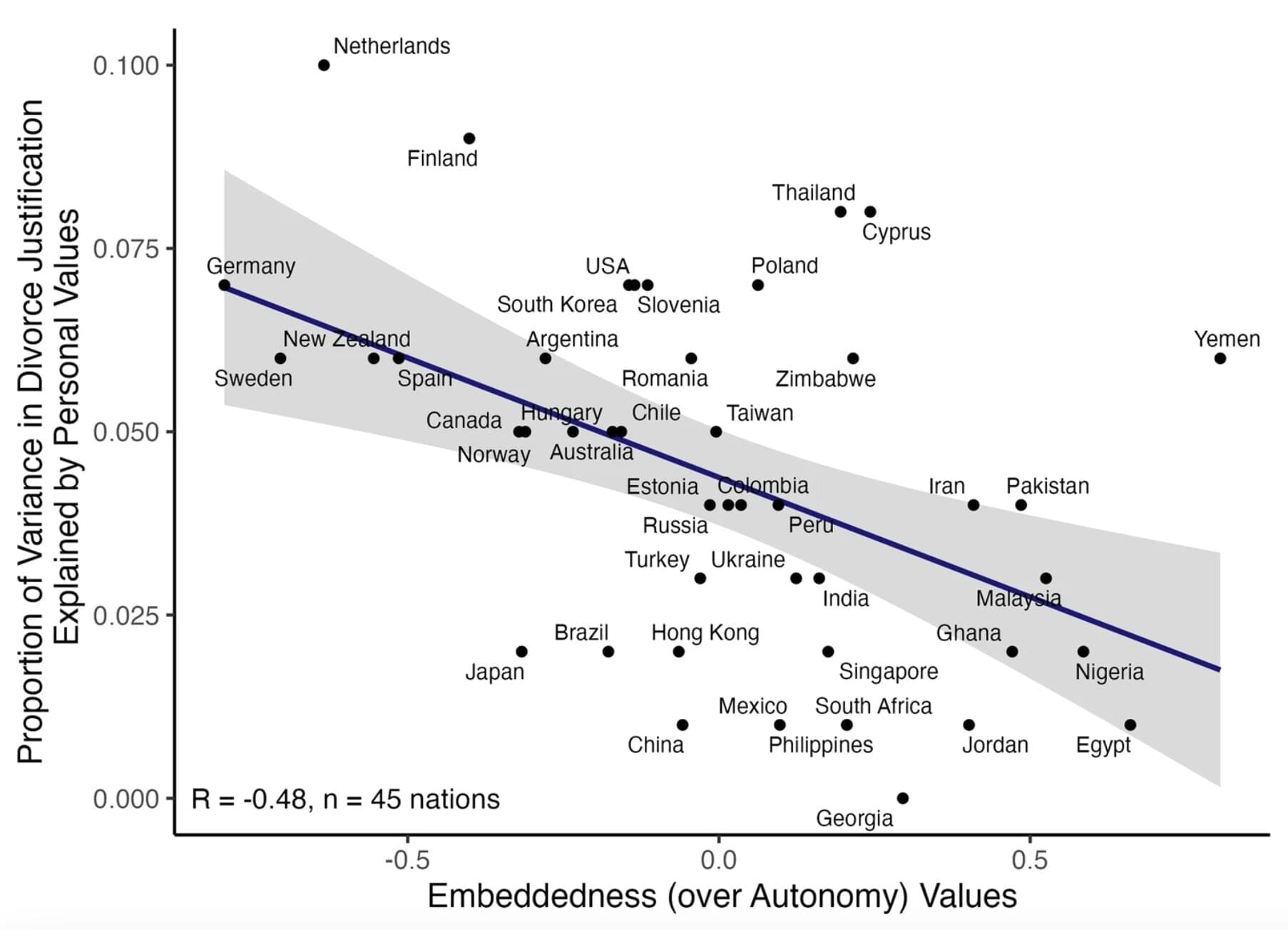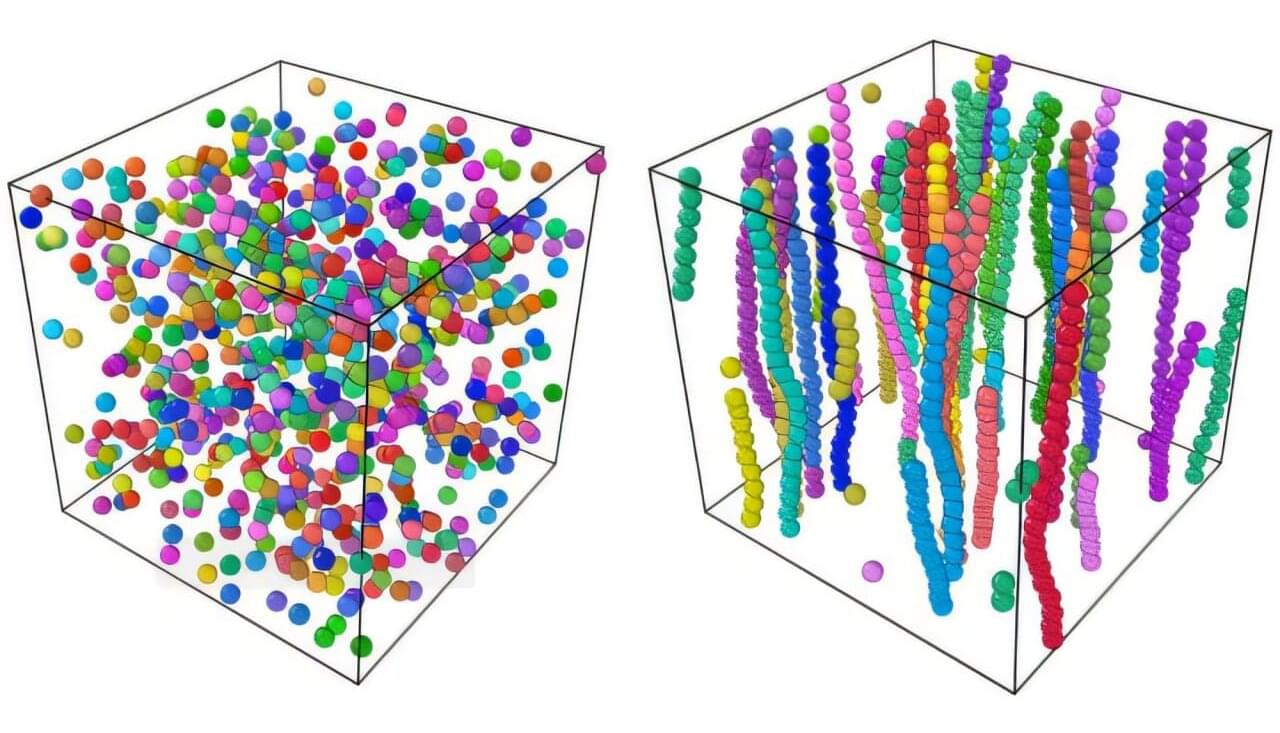Get the latest international news and world events from around the world.

Divorce can be predicted by interactions between cultural and personal values, study finds
Divorce, the legal dissolution of marriage, can be driven by a variety of factors, ranging from changes in the economic status or health conditions of spouses to contrasting values. The end of a marriage can often be challenging to process. Thus, it can have adverse effects on the well-being and mental health of ex-spouses.
On average, the rates of divorce worldwide have increased over the past century. Improved understanding of the primary factors that prompt people to dissolve a marriage could help to devise more effective couples and marriage counseling strategies, potentially contributing to a reduction in divorce rates.
Sari Mentser and Lilach Sagiv, two researchers at the Hebrew University of Jerusalem, recently carried out a study specifically exploring the relationship between people’s values and divorce. Their findings, published in Communications Psychology, suggest that interaction between spouses’ cultural and personal values can predict divorce.
From collisions to stellar cannibalism—the surprising diversity of exploding white dwarfs
Astrophysicists have unearthed a surprising diversity in the ways in which white dwarf stars explode in deep space after assessing almost 4,000 such events captured in detail by a next-gen astronomical sky survey. Their findings may help us more accurately measure distances in the universe and further our knowledge of “dark energy.”
The dramatic explosions of white dwarf stars at the ends of their lives have for decades played a pivotal role in the study of dark energy—the mysterious force responsible for the accelerating expansion of the universe. They also provide the origin of many elements in our periodic table, such as titanium, iron and nickel, which are formed in the extremely dense and hot conditions present during their explosions.
A major milestone has been achieved in our understanding of these explosive transients with the release of a major dataset, and associated 21 publications in an Astronomy & Astrophysics special issue.

Nanoparticles successfully deliver genetic material to plants via roots
University of Queensland researchers have for the first time introduced genetic material into plants via their roots, opening a potential pathway for rapid crop improvement. The research is published in Nature Plants.
Professor Bernard Carroll from UQ’s School of Chemistry and Molecular Biosciences said nanoparticle technology could help fine-tune plant genes to increase crop yield and improve food quality.
“Traditional plant breeding and genetic modification take many generations to produce a new crop variety, which is time-consuming and expensive,” Professor Carroll said.

Greetings from the fourth dimension: Scientists glimpse 4D crystal structure using surface wave patterns
In April 1982, Prof. Dan Shechtman of the Technion–Israel Institute of Technology made the discovery that would later earn him the 2011 Nobel Prize in Chemistry: the quasiperiodic crystal. According to diffraction measurements made with an electron microscope, the new material appeared “disorganized” at smaller scales, yet with a distinct order and symmetry apparent at a larger scale.
This form of matter was considered impossible, and it took many years to convince the scientific community of the discovery’s validity. The first physicists to theoretically explain this discovery were Prof. Dov Levine, then a doctoral student at the University of Pennsylvania and now a faculty member in the Technion Physics department, and his advisor, Prof. Paul Steinhardt.
The key insight that enabled their explanation was that quasicrystals were, in fact, periodic—but in a higher dimension than the one in which they exist physically. Using this realization, the physicists were able to describe and predict mechanical and thermodynamic properties of quasicrystals.

Korean team unveils fine structure of magnons for neuromorphic devices
A Korean research team has succeeded in securing a basic technology for further improving the completeness level of neuromorphic devices. Their paper is published in the journal Nature Communications.
Researchers from the Korea Research Institute of Standards and Science observed the fine structure of the magnon, which is attracting attention as a key material for neuromorphic devices. As areas that are approximately 1,000 times finer than before were observed successfully, it is expected that the results will enable the design of more sophisticated neuromorphic devices.
Neuromorphic devices are next-generation semiconductors designed to mimic the structure of the human brain. They process information by mimicking the way neurons generate signals and transmit them to other neurons through synapses.

Scientists achieve electrical manipulation of spin filling sequence in bilayer graphene quantum dots
A research team from the University of Science and Technology of China has demonstrated the ability to electrically manipulate the spin filling sequence in a bilayer graphene (BLG) quantum dot (QD). This achievement, published in Physical Review Letters, showcases the potential to control the spin degree of freedom in BLG, a material with promising applications in quantum computing and advanced electronics.
BLG has drawn extensive attention in recent years due to its unique properties. When an out-of-plane electric field is applied, it can generate a tunable band gap. Moreover, the trigonal warping effect, caused by the skew interlayer coupling, gives rise to additional minivalley degeneracy, greatly influencing the behavior of charge carriers. Quantum dot devices, which can precisely control the number of charge carriers, have become a crucial tool for studying these phenomena at the single-particle level.
The research team delved into the intricate dynamics of electron shell structures within bilayer graphene quantum dot, focusing on how these structures can be manipulated through the trigonal warping effect, a unique feature of bilayer graphene. They employed a highly tunable quantum dot device, which provided the means to control the electron filling sequence. They began by applying a small perpendicular electric field, observing that the s-shell filled with four electrons, two with spin-up and two with spin-down, each from opposite valleys.

Active matter: Scientists create three-dimensional ‘synthetic worms’
Researchers at the University of Bristol have made a breakthrough in the development of “life-like” synthetic materials which are able to move by themselves like worms.
Scientists have been investigating a new class of materials called “active matter,” which could be used for various applications from drug delivery to self-healing materials.
Compared to inanimate matter—the sort of motionless materials we come across in our lives every day, such as plastic and wood—active matter can show fascinating life-like behavior.

Generating record-speed waves on extremely water-repellent surfaces
Ripples, like ones produced by raindrops falling in a puddle, are also called capillary waves. Studied since antiquity, they have garnered considerable interest in modern science due to their ability to reveal information about the medium on which they travel. This makes them particularly valuable for studying soft and biological matter in microfluidic applications, which focus on how fluids behave in microscopic environments.
Now physicists and biomedical researchers from Aalto University’s Department of Neuroscience and Biomedical Engineering and Department of Applied Physics have unearthed new characteristics of capillary waves, setting a record for their speed while doing so.
The paper is published in Nature Communications.

3.5 Kilometers Underwater, Scientists Found a Staggeringly Energetic Particle From Outer Space
Three and a half kilometers beneath the Mediterranean Sea, around 80km off the coast of Sicily, lies half of a very unusual telescope called KM3NeT.
The enormous device is still under construction, but today the telescope’s scientific team announced they have already detected a particle from outer space with a staggering amount of energy.
In fact, as the team report in Nature, they found the most energetic neutrino anyone has ever seen—and it represents a tremendous leap forward in exploring the uncharted waters of the extreme universe.